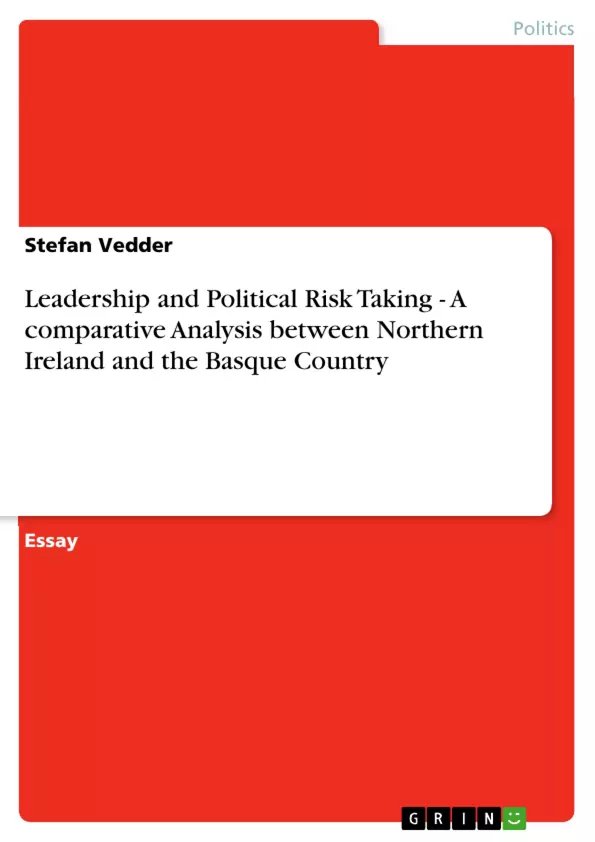Some argue tat most major conflicts are triggered by internal, elite-level activities. At the same time peace processes are often elite-driven with a relatively small number of people responsible for making final decisions. The following analysis examines different attempts in Northern Ireland and the Basque Country to contribute sustainably to a peace process on a political elite-level. It will be shown that the success of leadership and political risk-taking by elites is highly dependent on the circumstances. It will be shown that courageous elite decisions are doomed to have little effect if basic requirements are lacking. Simultaneously, even if the preconditions seem to be appropriate peace processes can fail due to a lack of commitment on the side of political leaders.
The conflicts in Northern Ireland and the Basque Country show – up to a certain extent – notable similarities in their initial situations. In both cases nationalist movements tried/try to alter the state of autonomy in one part of the country. Both conflicts led to cruel violence and left numerous civilians dead. Both conflicts took and take politically place within the particular province and between the province and the federal government of the nation state (Spain/United Kingdom and Ireland). The nationalist movements in both cases are divided between a radical party (Batasuna/Sinn Fein) and a more moderate one (PNV/SDLP). These similarities compose a good starting point for a comparative analysis.
Regarding the generalizability of the findings, two central restrictions must be made. First the small number of cases (only two) discussed in this paper limit the possibility to draw universal conclusions. In statistical terms the extent of the sample is insufficient to make a valid statement about the relation of the variables „leadership and political risk taking‟ and „development or outcome of a peace process‟. Another crucial point is that the variables in the two cases are not perfectly independent from each other as political decisions made in Northern Ireland are thought to have had an influence on the political sphere and thus on the peace process in general in the Basque Country.
Inhaltsverzeichnis (Table of Contents)
- Leadership and political risk taking: a comparative analysis of the conflicts in Northern Ireland and in the Basque Country
- The Northern Ireland conflict
- The Basque conflict
Zielsetzung und Themenschwerpunkte (Objectives and Key Themes)
This analysis examines different attempts in Northern Ireland and the Basque Country to contribute sustainably to a peace process on a political elite-level. It argues that the success of leadership and political risk-taking by elites is highly dependent on the circumstances, and that even if the preconditions seem to be appropriate, peace processes can fail due to a lack of commitment on the side of political leaders.
- The role of leadership in peace processes
- The impact of political risk-taking on conflict resolution
- The importance of inclusive and exclusive peace processes
- The interplay between elites and non-elites in conflict resolution
- The role of external actors in peace processes
Zusammenfassung der Kapitel (Chapter Summaries)
The Northern Ireland conflict
The chapter focuses on the history of the Northern Ireland conflict, analyzing various moments of political risk-taking by different leaders who attempted to contribute to a political settlement. It discusses the role of the British government, the Irish government, and the various factions within Northern Ireland, including the IRA, the Ulster Unionists, and the SDLP. It examines the impact of events such as the Sunningdale Agreement, the Anglo-Irish Agreement, and the Hume-Adams process on the conflict.
The Basque conflict
The chapter examines the Basque conflict, focusing on the role of leadership and political risk-taking in the attempts to resolve it. It discusses the history of the Basque movement, the role of ETA, and the different attempts at peace negotiations between the Basque government, the Spanish government, and the various factions within the Basque movement.
Schlüsselwörter (Keywords)
The main keywords and focus topics of the text include leadership, political risk-taking, conflict resolution, peace processes, Northern Ireland, Basque Country, IRA, ETA, Sunningdale Agreement, Anglo-Irish Agreement, Hume-Adams process, inclusive and exclusive peace processes, elites and non-elites, external actors.
Frequently Asked Questions
What is the focus of the comparative analysis between Northern Ireland and the Basque Country?
The analysis examines attempts at a political elite level to contribute sustainably to peace processes through leadership and political risk-taking.
Why do some peace processes fail according to this document?
Processes can fail due to a lack of commitment from political leaders, even if the necessary preconditions for peace seem to be in place.
What are the similarities between the conflicts in Northern Ireland and the Basque Country?
Both involved nationalist movements seeking autonomy, led to significant violence, and featured divisions between radical (Batasuna/Sinn Fein) and moderate parties (PNV/SDLP).
What are the limitations of the findings in this study?
The small number of cases (only two) limits universal conclusions, and the variables are not perfectly independent as Northern Ireland's decisions influenced the Basque sphere.
Which specific political agreements are discussed in the Northern Ireland chapter?
The text examines the impact of the Sunningdale Agreement, the Anglo-Irish Agreement, and the Hume-Adams process.
What role do external actors play in conflict resolution?
The study highlights the role of external actors and the interplay between elites and non-elites as key themes in resolving these conflicts.
- Quote paper
- Stefan Vedder (Author), 2010, Leadership and Political Risk Taking - A comparative Analysis between Northern Ireland and the Basque Country, Munich, GRIN Verlag, https://www.grin.com/document/155834



